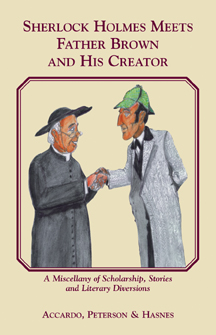


During a century of diverse Sherlockian studies, close detailed attention to the almost contemporary Father Brown stories of G.K. Chesterton remained in its infancy. Brownian researches have begun to appear sporadically in the last two decades. The purpose of the present volume is to collect some of the fruits of these infant researches in order to stimulate a greater appreciation of the significance of Father Brown to the history of detective fiction as well as one aspect of the subtle and often underestimated fictional art of GKC. Some of the material herein collected has appeared previously in other forms not now readily available to the scholar, but much of it has been newly commissioned for this volume.
Comparative studies on both Sherlock Holmes and Father Brown are especially apropos given the friendly relationship between their creators, Arthur Conan Doyle and Gilbert Keith Chesterton. Indeed, Father Brown was a composite of both an homage to Holmes and of a criticism of his more restrictive methods. Situating Brownian criticism in direct contiguity with the paradigmatic Sherlockian model opens a whole new area for Holmesian studies. This is a tactic which purists have been reluctant to adopt since they adopt the position that in contrast to other fictional detectives Holmes is a real historical character. To compare him with a fictional character would undermine their basic presupposition However, since Father Brown is just as credible as a real historical character, nothing is to be lost and much to be gained by studies such as appear in the present volume. Since one of the mainstays of Sherlockiana has long been the pastiche, several of these with Father Brown (and sometimes with Holmes) are attempted. Essays on John Dickson Carr and some medical aspects of Conan Doyle have also found their way into the pages of this collection. The essays in the present volume do not always agree with one another, and that in itself should invite further discussion.
Hard Cover, 400p.
ISBN 1-55246-188-2 $45.00
Other Books by the Pasquale Accardo